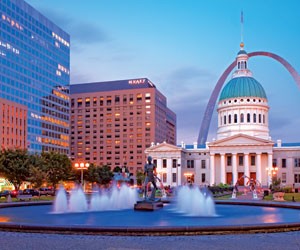When it comes to lead times for booking corporate functions, meeting planners seem to be of two minds. They’re booking larger meetings on longer lead times but the far more numerous smaller meetings are being done on short lead times of 90 days or less. Both methods, though, take the bottom line into account.
Diana Marinos, senior project manager on the event team of Boston Scientific, exemplifies the dual strategy that many planners are deploying.
At present, Marinos has booked the medical technology company’s annual national sales meeting for 2,000 people on a two-year lead time, through 2014. But this summer, she expects to receive approval to book the event with an extra year of lead time, or even possibly through 2017.
“It’s getting more competitive to find availability for our national sales meeting,” she said.
At the same time, Marinos continues to book internal training meetings for up to 200 people with lead times of just three or four months.
For events requiring relatively limited meeting space and sleeping rooms, there’s sufficient availability at competitive rates, she explained. So senior managers, still wary of economic volatility, don’t see a need to commit money before absolutely necessary.
Marinos’ experience is borne out by data compiled by Pegasus Solutions, the giant global distribution system for lodging that processes billions of room reservations monthly and represents 90,000 properties worldwide.
Hotel-reservation lead times in February for business travelers in North America exceeded the lead times of February last year by more than 11 percent, according to the company. Significantly, the lead times also exceeded pre-recession levels; nearly 23 days this past February versus just over 19 days in February 2007—the most recent pre-recession data available.
Lead times for leisure bookings are also rising—about 6.5 percent this February over last—contributing to the tightened availability.
While Pegasus reported that overall hotel bookings by corporations remained relatively flat through April compared to last year, the company said in the following statement: “Opportunity lies in the group and meetings market, where increased activity is helping drive rate growth.”
Carlson Wagonlit, the big, Minneapolis-based corporate travel agency, has seen lead times for all kinds of corporate meetings extend to 80 to 90 days this year as compared with 60-70 days last year, according to Nikki McLain, global program manager at the company.
“Most clients have the budgets, so they’re going ahead with their meetings,” McLain said. “We’re not seeing a lot of pushback from clients who want to wait before committing.”
Still, the increase falls within what is traditionally considered a short-term booking window.PageBreak
The site-selection company HelmsBriscoe, which booked some 4.5 million room nights on behalf of corporate clients last year, is seeing post-recession changes.
“The lead time for booking corporate meetings has shortened dramatically in the last few years, and this continues to be the trend,” said Greg Malark, COO. “The uncertainty in the business climate still seems to have many clients waiting until the last minute to commit.”
However, there are exceptions.
“Groups that need a great deal of space or lack flexibility in the dates of their meeting need to book further out,” Malark said.
With the buyer-seller balance tilting toward hoteliers, HelmsBriscoe is advising clients to book further in advance not only for availability but also to stem rising rates. HelmsBriscoe tends to handle meetings that average about 150 room nights; small enough for many of those events to be booked on relatively short lead times.
“There has not been a significant premium paid by groups over the last few years for short-term buys,” Malark said. “The group may not be going into its preferred destination, but we have been successful in matching short-term buys with properties that have availability.
“This is becoming more difficult as demand is catching up to supply,” he continued, “and we are working with our clients to commit further out to ensure they can get the space they require at a reasonable price.”
Boston Scientific meeting planner Diana Marinos, echoed Malark’s comment about tightened supply, citing a dearth of new hotel construction for the larger properties she needs to hold her company’s national sales meeting.
“We haven’t seen new properties keeping up with demand,” Marinos said.
Hyatt Hotels & Resorts, in reporting its first-quarter earnings in early May, also saw a lot a corporate wariness despite a measureable increase in group business.
“In terms of [booking] windows, it’s still fairly short,” said Hyatt chief executive Mark Hoplamazian during an investor conference to discuss the report. “Many meetings have been booked within 90 days.”
Group bookings in the quarter—for events held in the quarter—rose 20 percent over last year while bookings in the quarter for the year rose 13 percent, according to Hoplamazian. Overall, he said the booking pace of group business—as measured by dollar volume—is up four percent over the same period last year. He attributed two-thirds of the increase to demand and one-third to rate increases of about six percent.
“The strength we saw in the group business in the quarter primarily came from corporate business,” Hoplamazian said. “And in terms of sectors, consulting technology and IT (information technology) were the prime drivers of the group business growth that we saw in the quarter.”
Jack Horne, Hyatt’s senior vice president of sales for North America, said that a bias toward smaller meetings by corporate decision-makers—corporate meetings at Hyatt average 125 room nights—remains a residual effect of the recent business upheaval. And as a result, big-box hotels are booking more small meetings.
“Denver and Chicago are seeing great demand for small meetings booked short term,” said Horne.
With the increased group demand, hotels are predictably less willing to negotiate concessions. The rebates and loyalty points Hyatt offered groups last year as a corporate-wide policy ended with the new year, according to Horne.
“There’s not as much need to do that as business demand and the economy improves,” said Horne. “Now we’re letting properties tailor their own offerings for meetings.”
Evidenced by its Q1 statement, Hyatt has good reason for feeling more confident in its dealings with corporate meeting planners. The company reported a 9-percent increase in group room revenue at comparable North American full-service hotels in the first quarter of this year over the same quarter last year.
Despite the edge that hotels are gaining over corporate meetings buyers, Pegasus nonetheless advises hoteliers to pay heed to the past financial turmoil that companies have suffered—and how they’ve changed as a result.
“Keep in mind that companies are growing more and more savvy,” the company said in a newsletter, “and they get tired of the extra and often exorbitant fees added to the quoted price for meeting room essentials, such as wireless Internet connections, audio/video equipment usage, etc.
“Those hosting and attending a meeting equally appreciate a package that is just as budget friendly at the onset as it is when the invoice arrives,” the newsletter stated, “creating a practice of transparency or straightforwardness that will result in return visits.”






